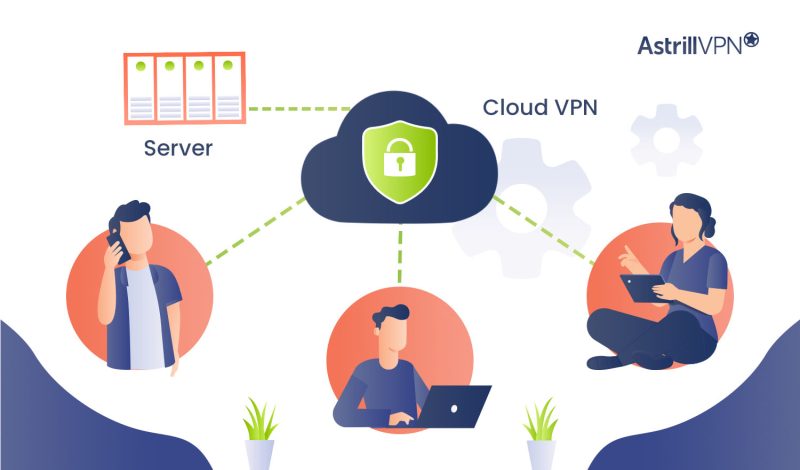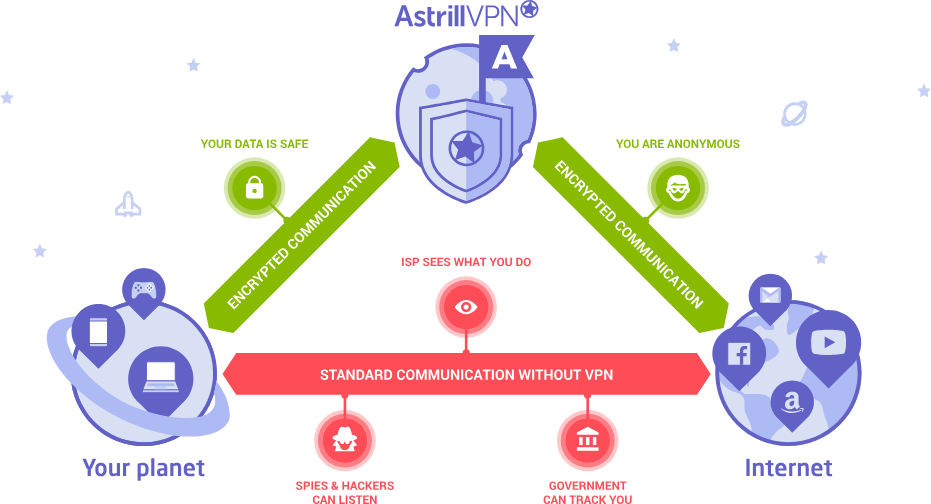What is a Cloud VPN and How Does it Work?

Bisma Farrukh

As more and more workplaces adopt hybrid work setups, the need for secure remote data access has become evident. Companies and employees need to be able to access resources from home and portable devices, without risking data breaches or compromised security.
Virtual private networks are already in use by many businesses worldwide, allowing secure, anonymous online browsing and access to company resources. Traditional VPNs are not without their limitations, however, and it might be time for your organization to ask: what’s next?
Enter cloud VPNs. With all the benefits and uses of a traditional VPN, cloud VPNs also leverage the power of the cloud.
Cloud-based solutions are gaining traction as they are easier to set up, eliminate hardware requirements, and allow more flexibility than their conventional counterparts. This applies to telephone systems and photo storage – why not VPN?
This article will explain exactly what a cloud VPN is and how it works, along with benefits and best practices to keep in mind.
But first, let’s take a step back.
Table of Contents
What is VPN?
VPN stands for virtual private network. It is essentially a secret, secure tunnel that encrypts and masks your internet activity. This means you can surf anonymously, bypass censorship, enjoy secure Wi-Fi wherever you go, and view region-specific content from anywhere.
The purpose of a VPN is to keep your data safe and help you get to places privately online.
There are many reasons you might use a VPN – from bypassing geographical restrictions to watch your favorite show, to avoiding cyber criminals on public wifi. VPNs are also an enormous asset to modern businesses.
For example, let’s say your team comprises remote workers across the globe. You want them to be able to log in, check work details, and access company resources, whether they’re in a home office or sitting in a coffee shop.
This is where VPNs come in to ensure safe and flexible internet connection. By allowing remote desktop management, it’s almost like employees can take their work computer everywhere they go, except it’s all done through a virtual private network.

However, a traditional VPN relies on dedicated hardware and infrastructure to achieve this – meaning it is not as practical or accessible as if your employees were able to leverage the flexibility of the cloud.
What is a Cloud VPN?
Think of how a cloud telephone system works. Rather than using traditional phone lines, and operating out of a single premises, calls are hosted over the cloud — a network of remote servers used to store and manage data, and run software applications over the internet.
It’s the same principle with cloud VPNs. They provide the same security, connectivity, and remote access features as traditional VPNs, but rather than relying on physical hardware and network applications, they’re implemented as cloud-based services.
This eliminates the need to own and manage physical servers, thus opening up new possibilities for businesses when it comes to remote work and global collaboration.
How does Cloud VPN work?
The goal is the same as with traditional VPNs: to create a secure encrypted tunnel between a user’s device and a corporate network. This time, this tunnel is in the cloud.
A cloud VPN works by securing the cloud, enabling remote access, and encrypting transmitted data.
When you connect to a cloud VPN, your data is encrypted. Then, unreadable code is transmitted through a secure tunnel in the cloud. This code passes through what is called a VPN gateway.
The gateway forms the central node of the VPN. It creates secure connections between users, online applications, and networks, facilitating secure data transfer between different systems. Going back to the tunnel analogy, the VPN gateway is like a gatekeeper that checks authentication before users are allowed to pass through and connect.
There are different types of VPN gateway for different contexts (e.g. remote access, site-to-site, router to router). Research the best fit for your purposes. An API gateway enhances connectivity and is particularly useful if you’re building on top of a microservices architecture, for example.
In short, cloud VPNs work by a combination of encryption, tunneling, and gateway management which create a safe and private connection, thereby allowing access of company resources from remote devices.
Why you need a Cloud VPN
As it stands, it is exceptionally difficult for a business to compete if they are not taking advantage of cloud-based solutions.
Traditional or static VPNs don’t cut it anymore — relying on on-premise VPN servers is expensive, time-consuming, and much less flexible than using the cloud. In an age with more and more remote workers spread across the globe, businesses need the ease and scalability of cloud-based VPNs.
Five benefits of a Cloud VPN
A cloud VPN is a unique cybersecurity solution, differing from a traditional VPN as it requires no hardware or IT support. As such, it is a huge asset for businesses looking for a competitive edge in an increasingly technologically advanced landscape.
Why should you use a Cloud VPN? What’s special about it, and how can it benefit you or your business? Here are 5 key advantages of using a Cloud VPN.
1) Enhanced security
Data privacy matters for businesses. That’s why a cloud-based VPN is such an asset: using robust encryption protocols, it protects your data from being intercepted or accessed by unauthorized personnel.
You can imagine the encryption process sort of like an envelope, hiding your data from everyone but authorized recipients.

2) Scalability and flexibility
A Cloud VPN is better than a traditional VPN in terms of scalability and flexibility. It can easily accommodate growing user bases and changing business requirements without the need for extensive hardware updates. Since you don’t need to change a physical network, businesses can easily scale up or scale down when needed.
3) Cost efficiency
Partly as a result of this flexibility, cloud VPNs are known for being cost-efficient. In addition to reduced upfront costs, eliminating the need for physical infrastructure means dramatically reducing ongoing maintenance expenses.
4) Remote access and global accessibility
Unlike traditional VPN, a cloud VPN can be rapidly deployed on a global scale. As a result, employees are able to securely access corporate resources from anywhere they happen to be, whether it’s a remote office or coffee shop.
5) Compatibility
Many third party cloud VPN providers allow for integrations with other cloud-based services. Businesses today are turning to cloud-based operations for more and more of their essential needs. For example, Vonage call center cloud solutions like automatic call distribution (ACD) and interactive voice response (IVR), leverage the security and flexibility of the cloud to streamline business communications.
Processes run more smoothly if your VPN is cloud-based and therefore compatible with any other cloud services your business uses. When companies can use one solution for all cloud-based and on-premises resources, it becomes easier to unify data, access resources remotely, and keep all team members on track for what needs to be done.
Maximizing call center security with Cloud VPN
As mentioned, many cloud VPN providers offer seamless integration with other cloud-based services. This is especially useful when it comes to cloud-based call center solutions.
A cloud VPN uses encryption to ensure that customers’ sensitive information is kept secure during call center interactions — protecting against eavesdropping and interception.
A cloud VPN also allows call center agents and employees to access call services remotely. Whether they are working from home or on the move, a cloud VPN makes sure that their connections are encrypted and secure.
To optimize the efficiency of this effort, check out these call center management tips.
Best practices
While Cloud VPNs address many of the problems associated with traditional VPNs, they are still not without risk, especially in terms of data security. Here are some best practices which organizations should follow when configuring and deploying cloud VPN.
Employ dynamic routing and tunnel configuration methods
When you’re selecting a cloud VPN gateway, we recommend choosing one which enables dynamic routing and supports active/passive tunnel configuration. This will make it easier to handle routing issues effectively.
Manage security concerns
Companies need to be vigilant when deploying cloud VPN software, as there is a risk of data breaches if a malicious actor accesses network resources.
Companies can mitigate security concerns by:
1. Using firewall rules in VPN gateways
It’s good practice to establish firewall rules to manage how traffic travels across the cloud VPN.
2. Applying strong pre-shared keys
You should also generate strong pre-shared keys to safeguard data traveling through cloud VPN tunneling.
3. Educating all employees about risks
Each user’s access point security is crucial to ensuring the overall safety of the VPN, so make sure every employee knows how to use a VPN safely, and is doing their bit to keep company data secure.
Use a secure domain name
Purchasing a relevant domain name from a provider like OnlyDomains not only simplifies user access, but through SSL certificate integration, it also adds another layer of security. Strategic domain name acquisition therefore enhances your cloud VPN’s effectiveness in safeguarding sensitive data.
Final thoughts
In conclusion, the global shift towards remote work necessitates a robust solution to allow secure data access, making cloud VPNs an invaluable asset.
As more and more digital solutions turn to cloud-based operations, it only makes sense to upgrade your VPN to match. Rather than owning and maintaining the required physical infrastructure, you can easily deploy cloud VPNs globally, allowing employees to get the job done wherever they happen to be.
Cloud VPNs offer enhanced security, scalability, and flexibility. With no more maintenance costs, they are a budget-friendly solution — and you even have the option to make immediate adjustments in response to demand. Additionally, their compatibility with other cloud-based services is great for fostering productivity and collaboration, as it means you can further streamline business operations.
Cloud VPNs have become indispensable tools for competitive, forward-thinking businesses. As organizations increasingly embrace cloud technology, cloud VPNs will continue to lead the way, enabling secure, anonymous browsing, and easy access to company resources.

No comments were posted yet